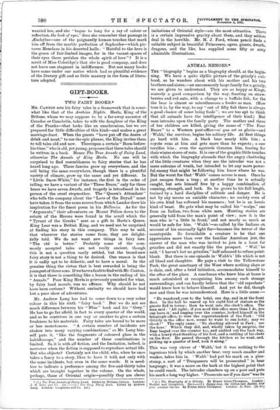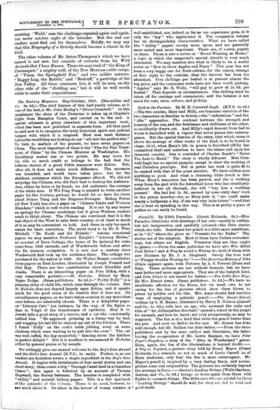ANIMAL HEROES.* THE " biography " begins as a biography
should, at the begin. ning. We have a quite idyllic picture of the grizzly's cub.
hood, as he wanders about with his mother and his two brothers and sister,—an uncommonly large family for a grizzly, we are given to understand. They are as happy as Kings,
scarcely a good comparison by the way. feasting on straw..
berries and red ants, with a change to a buffalo fish, for the the bear is almost as miscellaneous a feeder as man (Row
true it is, by the way, to eay "out of fifty fish there is always a good chance of some being fools"; we are too apt to think
that all animals have the intelligence of their kind.) But man intrudes upon the family party. The mother and three of . her children are killed, giving the name of "The Four Bears" to a Western post-office—si qua est ea gloria—and Wahb,' the survivor, begins his solitary life. At ;first things go hard with him. A black bear nearly kills him ; a coyote runs at him and gets more than he expects ; a cow terrifies him ; even the squirrels threaten him, fearing for their winter stores of nuts. It is one of the graphic little touches with which the biography abounds that the angry chattering of the little creatures when they see the intruder was not a mere outcome of Wrath, but intended to let any more power- ful enemy that might be following him know where he wai. But the worst foe that Walib 'comes across is man. Once he just escapes from a trap ; at another time he is actually caught, but sets himself free by a happy combination 'Of conning, strength, and luck. So he grows to his full length, trained by a hard discipline of solitude and danger. He is not Means an amiable character; no society even of his own kind has softened his manners ; but he is an _heroic kind of beast. He gets what may be called his "scalps," one from an Indian, two from white men. Hunting stories are generally told from the man's point of view ; now it is the man who is "a little in front," and not nearly *so mueli as would be safe for him. Wahb '—so called by the Indians on account of his unusually light fur—becomes the terror of the countryside. So formidable a creature is he that one appreciates more than ever the familiar American jest, the answer of the man who was invited to join in a hunt for grizzlies and did not exactly like the prospect. " Wal," he said, " I haven't lost no grizzlies," half ashamed to refuse point- blank. But there is one episode in' Wahb's ' life which is not all blood and slaughter. He pays a visit to the Yellowstone Park, the great sanctuary of the West where nothing slays or is slain, and, after a brief initiation, accommodates himself to the ethos of the place. A ranchman who knew him at home is much astonished at recognising him among such strange
surrounai gs, and can hardly believe that the "old reprobate" would know how to behave himself. And yet he did, though now and then he was misunderstood. Here is a little scene— "He wandered over to the hotel, one day, and in at the front door. In the hall he reared up his eight feet of stature as the guests fled in terror; then he went into the clerk's office. The man said : All right; if you need this office more than I do, you can have it,' and leaping over the counter, locked himself in the telegraph-office, to wire the superintendent of the Park : Old Grizzly in the office now, seems to want to run hotel ; may we shoot ? ' The reply came No shooting allowed in Park ; use the hose.' Which they did, and, wholly taken by surprise, the Bear leaped over the counter too, and ambled out the back way, with a heavy thud-thudding of his feet, and a rattling of his claws on the floor. He passed through the kitchen as he went, and, picking up a quarter of beef, took it along."
This was very clever of Wahb,' but it was nothing to the ingenious trick by which another bear, very much Smaller and weaker, takes him in. Wahl) ' had put his mark on a pine- stump, a , sort of "Trespassers will be prosecuted" in be language; it was a score on the bark at the highest point that he could reach. The intruder clambers up on a post and puts his mark a long way higher. "Prosecute me if you dare" was its • (I.) The Biography of a Griza2y, By Ernest Seton-Thompson. London' Hodder and Stoughton. (es.)—(2.) Baggy-Lug, the Cotton-tail Rabbit, and other Animal Stories. By Ernest Seton-Thompson. London : D. Nutt. (Sc. 6d.1 meaning. Wahb ' sees the challenge repeated again and again, but never catches sight of the intruder. But the end our readers must find out for themselves. Briefly, we may say that this Biography of a Grizzly should become a classic in its kind.
The other volume of Mr. Seton-Thompson's which we have named is not new, but consists of extracts from his Wild Animals that I have Known. There we may read of "the King of Currampaw," a mighty wolf, of the New Mexican cattle range, of "Vixen, the Springfield Fox," and two milder natures, " Raggy-Lug, the Rabbit," and "Redruff," a partridge of the Don Valley. All these creatures live, it will be seen, on the other side of the "dividing sea," but it will be well worth while to make their acquaintance.























































 Previous page
Previous page